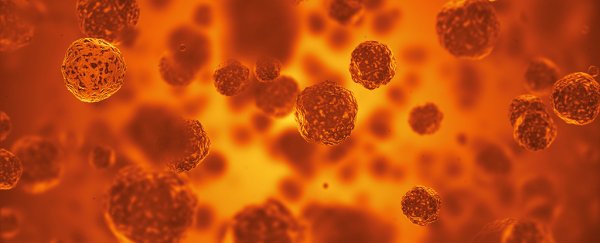Scientists are in a battle to develop treatments faster than viruses develop barriers against them, but new research suggests putting pathogens at war with each other could be an effective way of countering existing drug resistance, as well as preventing it in the future.
In a study of mice infected with malaria, researchers combined traditional drug remedies with a manipulated version of a nutrient that the malaria parasites rely on.
Importantly, the resistant strain needed more of this particular nutrient than the drug-sensitive pathogen - so the pathogens that could ignore antibiotics ended up more hungry.
By restricting the nutrient supply, the team of researchers forced the drug-resistant parasites and the drug-sensitive parasites into competition with each other, eventually wiping out the infection.
"By taking advantage of competition between parasites inside a host, we managed to use an existing drug to successfully treat an infection, even when drug-resistant parasites were already there," says biologist and lead researcher Nina Wale, now at the University of Michigan.
Drug resistance happens because pathogens, from bacteria to parasites, develop genetic mutations that shield them against treatment. Once that mutated pathogen survives, it can quickly replicate, rendering existing drugs ineffective.
Antibiotic resistance – when bacteria develop blockades against the power of antibiotics – is one specific and well-known type of drug resistance.
What happens in a typical scenario is that both drug-resistant and drug-sensitive variations of a pathogen initially thrive on the available resources. Traditional drugs work against the original strains, but the resistant mutations live on.
Take away those nutrients, and both drug-resistant and drug-sensitive variations suffer, the researchers found – they're effectively fighting over scraps, and the drug-resistant ones need more scraps to survive.
The drugs take care of one pathogen strain, while the other naturally dies off.
 (Penn State)
(Penn State)
"In the absence of drug treatment, the only thing that stops resistant pathogens from spreading is competition with the pathogens that are sensitive to drug treatment," says lead researcher Andrew Read, from Pennsylvania State University.
"We're utilising the natural force of competition to control the resistant ones and using conventional drugs to treat the sensitive ones."
When given the malaria nutrient in sufficient amounts, the infection persisted in 40 percent of the mice. The parasites also remained when mice were only given the drug-resistant strain of the disease to begin with.
But when the nutrient was limited, and both drug-resistant and drug-sensitive strains were used with the mice, the infection didn't rebound in any of the animals. That was also the case even when the drug-resistant parasites were outnumbering the others.
Now the principle of competition has been shown to work, the next step is to develop treatments. Researchers have to identify specific nutrients that pathogens rely on, particularly the drug-resistant strains, and then work out exactly when to restrict those nutrients and by how much.
But if the method is effective in humans as well, the benefits will be worth it. Drug resistance is complicating attempts to treat HIV, tuberculosis, and malaria, responsible for millions of deaths worldwide each year.
Resistant pathogens also cause problems in patients recovering from major surgery and treatments like chemotherapy.
Ultimately the research could lead us towards new ways of fighting drug resistance, as well as extending the effective life of drugs that pathogens have already developed some protection against.
"Typically if a physician detects drug resistance in an infection, they won't use that drug," says Read. "And that's okay if you've got another option."
"But if you haven't got another option, this is the sort of manipulation that would allow you to treat the patient even when resistance is there."
The research has been published in PNAS.
The team also put together a video explaining the process, which you can see below:

